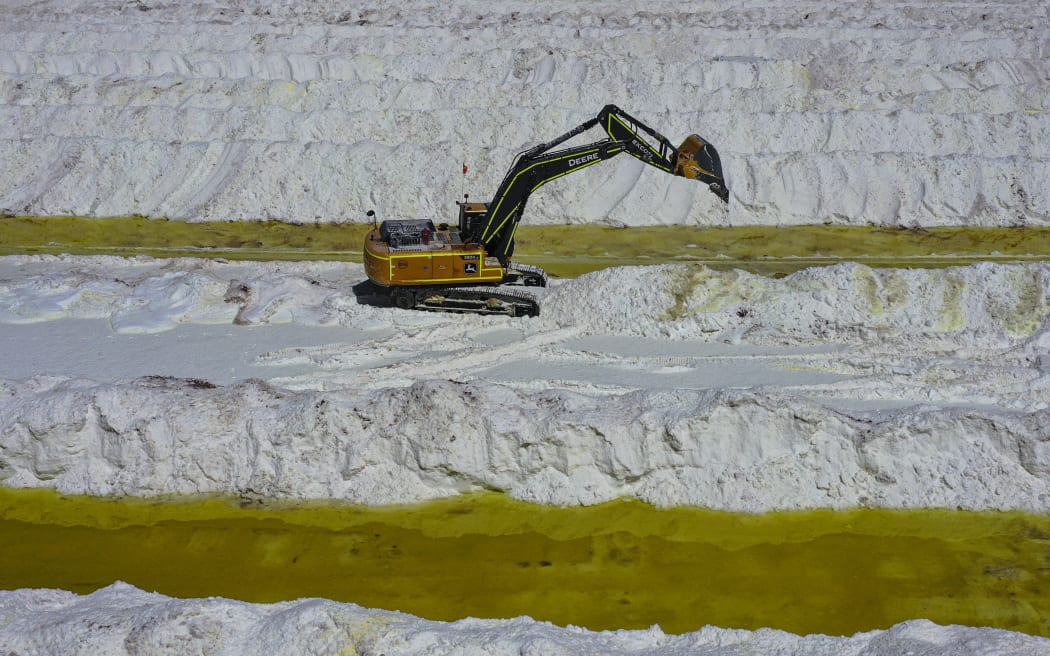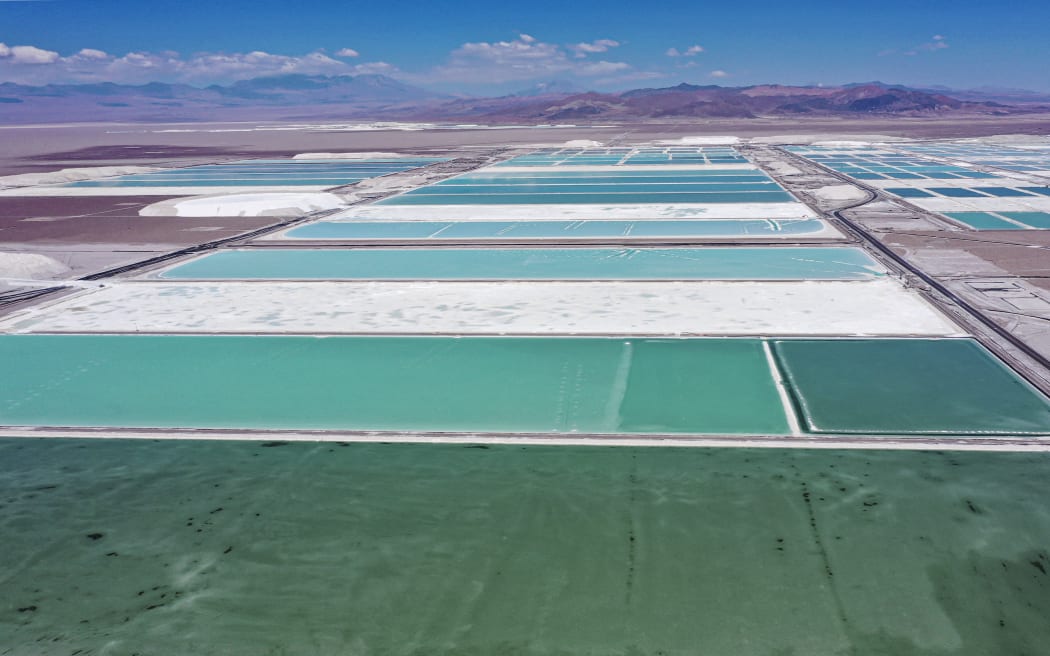Tensions grow as China ramps up global mining for green tech
By Global China Unit, BBC News
Aerial view of brine ponds and processing areas of a lithium mine in the Atacama Desert in Chile. Photo: AFP
Earlier this year, Ai Qing was woken up in the middle of the night by angry chants outside her dormitory in northern Argentina.
She peered out of the window to see Argentine workers surrounding the compound and blockading the entrance with flaming tyres.
"It was getting scary because I could see the sky being lit up by the fire. It had become a riot," says Ai, who works for a Chinese company extracting lithium from salt flats in the Andes mountains, for use in batteries.
The protest, sparked by the firing of a number of Argentine staff, is just one of a growing number of cases of friction between Chinese businesses and host communities, as China - which already dominates the processing of minerals vital to the green economy - expands its involvement in mining them.
It was just 10 years ago that a Chinese company bought the country's first stake in an extraction project within the "lithium triangle" of Argentina, Bolivia and Chile, which holds most of the world's lithium reserves.
Many further Chinese investments in local mining operations have followed, according to mining publications, and corporate, government and media reports. The BBC calculates that based on their shareholdings, Chinese companies now control an estimated 33 percent of the lithium at projects currently producing the mineral or those under construction.
But as Chinese businesses have expanded, they have faced allegations of abuses similar to those often levelled at other international mining giants.
For Ai Qing, the tyre-burning protest was a rude awakening. She had expected a quiet life in Argentina, but found herself involved in conflict mediation because of her knowledge of Spanish.
"It wasn't easy," she says.
"Beyond the language, we have to tone down many things, like how management thinks the employees are simply lazy and too reliant on the union, and how locals think Chinese people are only here to exploit them."
Latin America's "lithium triangle". Photo: AFP
The BBC Global China Unit has identified at least 62 mining projects across the world, in which Chinese companies have a stake, that are designed to extract either lithium or one of three other minerals key to green technologies - cobalt, nickel and manganese.
All are used to make lithium-ion batteries - used in electric vehicles - which, along with solar panels, are now high industrial priorities for China. Some projects are among the largest producers of these minerals in the world.
China has long been a leader in refining lithium and cobalt, with a share of global supply reaching 72 percent and 68 percent respectively in 2022, according to the Chatham House think tank.
Its capacity to refine these and other critical minerals has helped the country reach a point where it made more than half of the electric vehicles sold worldwide in 2023, has 60 percent of the global manufacturing capacity for wind turbines, and controls at least 80 percent of each stage in the solar panel supply chain.
China's role in the sector has made these items cheaper and more accessible globally.
But it's not only China that will need to mine and process minerals needed for the green economy. The UN says that if the world is to reach net-zero greenhouse gas emissions by 2050, their use must increase six-fold by 2040.
The US, the UK and the European Union have all developed strategies, meanwhile, to reduce their dependence on Chinese supplies.
As Chinese companies have increased their overseas mining operations, allegations of problems caused by these projects have steadily risen.
The Business and Human Rights Resource Centre, an NGO, says such troubles are "not unique to Chinese mining" but last year it published a report listing 102 allegations made against Chinese companies involved in extracting critical minerals, ranging from violations of the rights of local communities to damage to ecosystems and unsafe working conditions.
These allegations dated from 2021 and 2022. The BBC has counted more than 40 further allegations that were made in 2023, and reported by NGOs or in the media.
People in two countries, on opposite sides of the world, also told us their stories.
On the outskirts of Lubumbashi in the far south of the Democratic Republic of Congo, Christophe Kabwita has been leading opposition to the Ruashi cobalt mine, owned by the Jinchuan Group since 2011.
He says the open-pit mine, situated 500m from his doorstep, blights people's lives by using explosives to blast away at the rock two or three times per week. Sirens wail when the blasting is about to start, as a signal for everyone to stop what they are doing and take cover.
"Whatever the temperature, whether it's raining or a gale is blowing, we have to leave our homes and go to a shelter near the mine," he says.
This applies to everyone, including the sick and women who have just given birth, he adds, as nowhere else is safe.
In 2017 a teenage girl, Katty Kabazo, was reportedly killed by a flying rock on her way home from school, while other rocks are said to have punched holes into the walls and roofs of local houses.
A spokesperson from the Ruashi mine, Elisa Kalasa, acknowledged that "one young kid was in that area - she was not supposed to be there and was affected by the flying rocks".
She said that since then "we have improved the technology, and now we have the sort of blasting where there are no flying rocks any more".
However, the BBC spoke to a processing manager at the company, Patrick Tshisand, who appeared to give a different picture. He said: "If we mine, we use explosives. Explosives can cause flying rocks, which can end up in the community because the community is too close to the mine... so we had several accidents like that."
Kalasa also said that between 2006 and 2012 the company compensated more than 300 families to relocate further away from the mine.
On Indonesia's remote Obi Island, a mine jointly owned by a Chinese company, Lygend Resources and Technology, and Indonesian mining giant Harita Group has rapidly swallowed up the forests around the village of Kawasi.
Jatam, a local mining watchdog, says that villagers have been under pressure to move and accept government compensation. Dozens of families have refused to relocate, saying what is on offer is below market value. As a result, some say they have been threatened with legal action for allegedly disrupting a project of national strategic importance.
Jatam says old-growth forests have been logged to make way for the mine and they've documented how the rivers and ocean have been filled with sediment, polluting what was once a pristine marine environment.
"The water from the river is undrinkable now, it's so contaminated, and the sea, that is usually clear blue, turns red when it rains," Nur Hayati, a teacher who lives in Kawasi village, says.
Indonesian soldiers have been deployed to the island to protect the mine and when the BBC visited recently, there was a noticeable, increased military presence. Jatam claims soldiers are being used to intimidate, and even assault, people who speak out against the mine. Nur says her community feels the army is there to "protect the interests of the mine, not the welfare of their own people".
The military's spokesperson in Jakarta said allegations of intimidation "cannot be proven" and that while the soldiers were there to "protect the mine" they were not there to "directly interact with locals".
In a statement, he claimed the relocation of villagers to make way for the mine had been overseen by the police in a "peaceful and smooth manner".
Nur was among a group of villagers who travelled to the Indonesian capital, Jakarta, in June 2018, to protest against the impact of the mine. But a local government representative, Samsu Abubakar, told the BBC no complaints had been received from the public about environmental damage.
He also shared an official report that concluded Harita Group had been "compliant with environmental management and monitoring obligations".
Harita itself told us that it "adheres strictly to ethical business practices and local laws" and it is "continuously working to address and mitigate any negative impacts".
It claimed it had not caused widespread deforestation, it monitored the local source of drinking water, and independent tests have confirmed the water met government quality standards. It added that it had not carried out forced evictions or unfair land transactions and had not intimidated anyone.
A year ago, the Chinese mining trade body, known as CCCMC, started setting up a grievance mechanism, intended to resolve complaints made against Chinese-owned mining projects. The companies themselves "lack the ability - both cultural and linguistic" to interact with local communities or civil society organisations, says a spokesperson, Lelia Li.
However, the mechanism still isn't fully operating.
Meanwhile, China's involvement in foreign mining operations seems certain to increase. It's not just a "geopolitical play" to control a key market, says Aditya Lolla, the Asia programme director at Ember, a UK-based environmental think tank, it also makes sense from a business perspective.
"Acquisitions are being made by Chinese companies because, for them, it's all about profits," he says.
As a result, Chinese workers will continue to be sent to mining projects around the world and for them, these projects mostly present a chance to earn good money.
People such as Wang Gang, who has worked for 10 years in Chinese-owned cobalt mines in DR Congo. The 48-year-old lives in company accommodation and eats in the staff canteen, working 10-hour days, seven days a week, with four days' leave per month.
He accepts the separation from his family in Hubei province, because he earns more than he could at home. He also enjoys the clear skies and tall forests of DR Congo.
He communicates with local mine workers in a mixture of French, Swahili, and English, but says: "We rarely chat, except for work-related matters."
Even Ai Qing, who speaks the language of her host country fluently, has little interaction with Argentines outside work. She's started seeing a fellow Chinese worker, and they mostly hang out with other people like themselves - being thousands of miles from home pulls everyone closer.
A highlight for her is visiting the salt flats high up in the Andes where the lithium is mined and life is "chill".
"The altitude sickness always gets me - I can't fall asleep and I can't eat," she says. "But I really do enjoy going up there because things are much simpler, and there are no office politics."
Ai Qing and Wang Gang are pseudonyms.
Additional reporting by Emery Makumeno, Byobe Malenga, Lucien Kahozy.


No comments:
Post a Comment